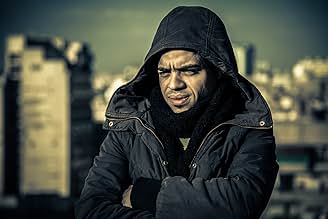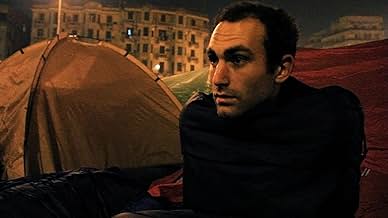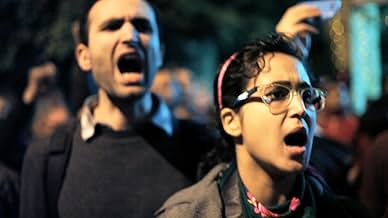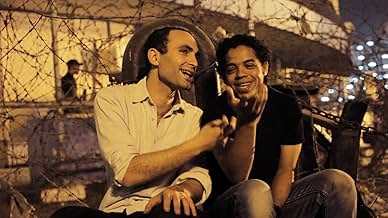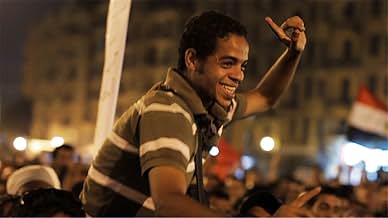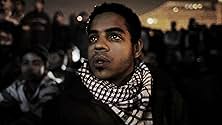IMDb RATING
8.0/10
9.5K
YOUR RATING
A group of Egyptian revolutionaries battle leaders and regimes, risking their lives to build a new society of conscience.A group of Egyptian revolutionaries battle leaders and regimes, risking their lives to build a new society of conscience.A group of Egyptian revolutionaries battle leaders and regimes, risking their lives to build a new society of conscience.
- Nominated for 1 Oscar
- 16 wins & 16 nominations total
Aydah El-Kashef
- Self - Revolutionary
- (as Aida El Kashef)
Storyline
Did you know
- TriviaThe film is both the first Kickstarter (crowd-sourced) film to be nominated for an Oscar, but it is also the first film released by Netflix to receive a nomination.
- Quotes
Ahmed Hassan - Revolutionary: We're not looking for a leader as much as we're looking for a conscience. What is a leader anyway? Are they going to offer solutions from the heavens? They won't do that. The thing is, if we are able to create this conscience within the society, we'll be able to find a good president. We are not looking for a leader to rule us.
- ConnectionsFeatured in The 2014 Film Independent Spirit Awards (2014)
Featured review
Greetings again from the darkness. This is the third of this year's five Oscar nominated documentaries I have seen, and thanks to the historic Texas Theatre, I'll get to see the last two as well. This one is directed by Cairo born and Harvard educated Jehane Noujaim. She sets out to capture the Egyption Revolution, as part of the Arab Spring, and now in it's third year. This is a look from inside the core of the revolution, not a washed-over CNN report.
It should first be noted that this revolution began as more of a protest. Citizens just fed up with the Mubarek regime began congregating in Tahrir Square in hopes of influencing change and a transition to a society of conscience. Ms. Noujaim and her multitude of cameras follows a hand full of these protesters and the changes that occur inside the revolution. These changes occur as Mubarek falls, the military takes over and betrays the movement, and then the Muslim Brotherhood takes control when Mohamed Morsi wins the election. This causes the loss of solidarity in the movement as it becomes clear that the Brotherhood consorted with the military to gain power, proving their mission was quite different.
One of the faces of the revolution is Egyptian actor Khalid Abdalla who you might recognize from the fine 2007 film The Kite Runner. Abdalla speaks excellent English and is clearly passionate about the vision. His comments also drive home the difference in a protest and the politics of a true revolution. We only get a couple of on camera comments from government and military officials, but the real insight and spirit of the film is captured in the faces, words and actions of those involved in the sit-ins, despite the many violent attempts to shut them down.
The most staggering visual comes from an aerial view of Cairo as the camera captures the masses as they descend on the streets during the third uprising that we see. It's breathtaking and in stark contrast to the news reports we saw in the U.S. Unfortunately, there is still no resolution in this as Egypt is still in flux and preparing for yet another election. That brings even more power to the "in the moment" point of view that this film delivers. http://moviereviewsfromthedark.com/
It should first be noted that this revolution began as more of a protest. Citizens just fed up with the Mubarek regime began congregating in Tahrir Square in hopes of influencing change and a transition to a society of conscience. Ms. Noujaim and her multitude of cameras follows a hand full of these protesters and the changes that occur inside the revolution. These changes occur as Mubarek falls, the military takes over and betrays the movement, and then the Muslim Brotherhood takes control when Mohamed Morsi wins the election. This causes the loss of solidarity in the movement as it becomes clear that the Brotherhood consorted with the military to gain power, proving their mission was quite different.
One of the faces of the revolution is Egyptian actor Khalid Abdalla who you might recognize from the fine 2007 film The Kite Runner. Abdalla speaks excellent English and is clearly passionate about the vision. His comments also drive home the difference in a protest and the politics of a true revolution. We only get a couple of on camera comments from government and military officials, but the real insight and spirit of the film is captured in the faces, words and actions of those involved in the sit-ins, despite the many violent attempts to shut them down.
The most staggering visual comes from an aerial view of Cairo as the camera captures the masses as they descend on the streets during the third uprising that we see. It's breathtaking and in stark contrast to the news reports we saw in the U.S. Unfortunately, there is still no resolution in this as Egypt is still in flux and preparing for yet another election. That brings even more power to the "in the moment" point of view that this film delivers. http://moviereviewsfromthedark.com/
- ferguson-6
- Jan 31, 2014
- Permalink
- How long is The Square?Powered by Alexa
Details
- Release date
- Countries of origin
- Official sites
- Languages
- Also known as
- Meydan
- Filming locations
- Tahrir Square, Cairo, Egypt(the main location)
- Production companies
- See more company credits at IMDbPro
Box office
- Budget
- $1,500,000 (estimated)
- Gross US & Canada
- $124,244
- Opening weekend US & Canada
- $16,359
- Oct 27, 2013
- Gross worldwide
- $124,244
- Runtime1 hour 35 minutes
- Color
Contribute to this page
Suggest an edit or add missing content








